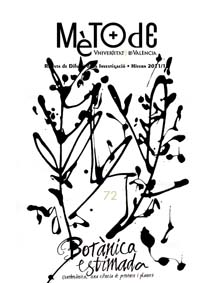
The next Mètode’s monographic issue focuses on ethnobotany, a discipline half way between natural and social sciences, which studies the relationship that exists between people and plants. The issue’s name is 'Botànica estimada. Etnobotànica, una ciència de plantes i persones' and it is coordinated by the Universitat de Barcelona’s full professor in botany, Joan Vallés Xirau.
The interdisciplinarity between natural and social sciences is, as the issue’s coordinator explains, ‘an infringement of the scientific inquiry paradigm’ for different researchers coming from different areas, from linguistics to botany ‘work in the same line and in close cooperation to understand how human perceive, know and manage the plant world.’
Throughout the issue, the importance of popular wisdom, traditional agriculture or medicinal or nutritional uses of plants is stressed. Thanks to the collaboration of several ethnobotany experts, the articles published talk about Mediterranean diet and wild plants, traditional agriculture, biodiversity and its preservation or about plants which are a touristic attraction like the Zapatitos de Venus in Aragón province. This range of articles shows the amount of topics ethnobotany can cover.
This monographic issue is completed with an interview to Lluís Villar, ethnobotany researcher in the Instituto Pirenaico de Ecología de Jaca and one of the persons who better knows The Pyrenees’ flora. He states that ‘our traditional landscapes have lost their original function’ and he goes for the recovery of the botanic knowledge of country areas.
The counterpoint to this winter issue is in charge of the artist Frederic Amat, who won the prize Premi Nacional d’Arts Visuals 2007. He presents a series of unique works inspired by botany and he has also disigned the issue’s cover. The writer Gaspar Jaén i Úbeda adds a literary counterpoint too with his illustrations, which he uses to recall the different plants which marked his childhood.
This new Mètode issue also includes, among others, a report on The Plantet of Apes, an interview to biochemist Margarita Salas, who has recently been awarded the prize Premio Prismas Especial Jurado, and a document on the El Palmar’ fishers community, created thirteen centuries ago. The regular issue’s sections of astronomy, history, cooking and science are included in the issue as well.
Last update: 20 de january de 2012 14:24.
News release



















